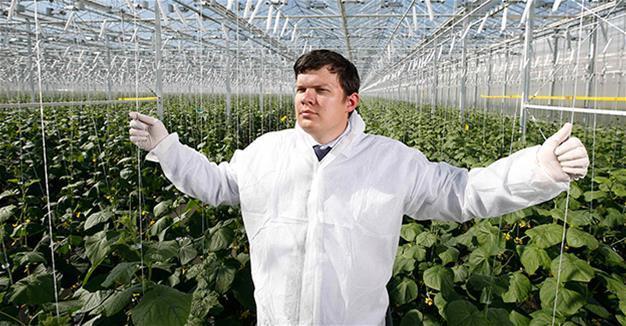Russian vegetable producer plans growth spurt thanks to import ban
DANKOV - Reuters
 Dmitry Lashin’s family have been building greenhouses in central Russia’s Lipetsk region for decades, but has moved into top gear since Moscow banned imports of fresh vegetables from Europe.
Dmitry Lashin’s family have been building greenhouses in central Russia’s Lipetsk region for decades, but has moved into top gear since Moscow banned imports of fresh vegetables from Europe.Russia’s retaliatory response to Western sanctions over the Ukraine crisis created an instant niche for domestic growers of tomatoes, cucumbers and lettuce -- a market that Lashin’s company and others like it are now filling with gusto.
The company, called Dolina Ovoshey, or Vegetable Valley, has imported cutting-edge greenhouse technology from the Netherlands, plans to invest $169 million next year in new greenhouses and expects to double production in the near future.
“This is very trendy now,” 34-year-old Chairman of the board Lashin said of the commercial greenhouse business.
Sanctions were imposed on Russia in 2014 for annexing Crimea from Ukraine, prompting Moscow to ban some western food imports. Russia then banned tomato imports from Turkey after Ankara downed a Russian military jet late in 2015.
Dolina Ovoshey’s first greenhouse for its own use was built in 2013 and the company -- in which Lashin and his father are minority shareholders -- now produces 21,000 tons of vegetables a year.
The company achieved net profit of 400 million rubles ($6.8 million) last year but is expected to hit 800 million rubles this year, Lashin said.
In the town of Dankov, 400km south of Moscow, Dolina Ovoshey has 33.4 hectares of greenhouses, with another 5.2 hectares in Yelets, 100 km south of Dankov. The company aims to have 108 hectares of greenhouses by 2019.
The Russian agriculture ministry says the Lipetsk region in central Russia is now the country’s fifth-biggest producer of vegetables in greenhouses as it starts to close the gap on top-producing southern Krasnodar and Stavropol.
By mid-August the Russian-wide harvest of vegetables from greenhouses -- - the main production method because of Russia’s cold climate -- was up 24 percent year on year at 551,000 tons, ministry data shows.
Dolina Ovoshey has already invested 8 billion rubles in production, with a further 7 billion roubles coming this year and 10 billion rubles more in 2018.
Lashin said that apart from state support for the sector, Dolina Ovoshey could raise funds from its shareholders.
“If shareholders want to develop faster, we will consider selling a minority stake while keeping control,” he said, adding that sovereign wealth fund Russian Direct Investment Fund (RDIF) has shown interest in the business.
An RDIF spokesman declined to comment.
















